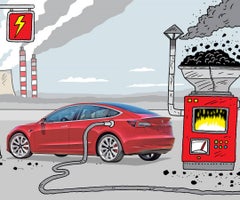MI SELECCIÓN DE NOTICIAS
Noticias personalizadas, de acuerdo a sus temas de interés

Electric vehicles that derive their power from dirty energy aren’t necessarily better for the environment, but they are better for Beijing
Exxon Mobil XOM +1.23% Chief Executive Officer Darren Woods recently took a shot at electric vehicles. Speaking at the Oil and Gas Climate Initiative late last month, he quipped that their purpose could be defeated if the vehicles are powered by electricity derived from burning coal.
The 2006 documentary “Who Killed The Electric Car” portrayed Big Oil executives as cartoonish enemies of a green future when EVs were in their infancy. Today, EVs really are a major threat to future demand for Exxon’s main commodity.
But there is at least a grain of truth to Mr. Woods’s criticism. China, the world’s largest crude importer, is also the world leader in electric vehicles. But it still gets much of its power from coal, the dirtiest source of electricity. Add in the energy-intensive process of making batteries, which China also seeks to dominate, and EVs aren’t particularly green-at least in China.
Bituminous coal emits 75% more carbon dioxide per million British thermal unit than natural gas, according to the U.S. Energy Information Administration. Even as developed countries shut coal power plants in reaction to environmental mandates or, in the case of the U.S., low gas prices, the fuel is still king in China and elsewhere in Asia. As China ramps up renewable energy, coal will still account for almost 50% of the power generated in China in 2028, according to research from Fitch Solutions, versus 15% in the U.S.
The boom in EVs will require a surge in power generation. The IEA projects that, in its higher-case scenario, EVs will generate an additional 1,100 terawatt hours of demand by 2030-about 5% of current world power production. While switching to electric cars and buses will cut down on tailpipe emissions in China, home to some of the world’s most polluted cities, it might not do as much to limit the effects of global climate change.
Internal combustion engines are inefficient, using only a fraction of the fuel in the car to power it. As a result, electric vehicle adoption globally will reduce “well-to-wheel” greenhouse gas emissions by half from an equivalent internal combustion engine fleet in 2030, the IEA projects in some of its scenarios.
But making batteries takes a lot of energy too, rendering the ultimate net impact somewhat unclear.
Considering Germany’s energy mix and the amount of energy used in battery production, the carbon emissions of battery-electric vehicles there are, in the best case, “slightly higher than those of a diesel engine,” according to German research group Ifo Institute.
In China, EV deployment should decrease overall greenhouse gas emissions even including battery production, research from the Belfer Center for Science and International Affairs concludes. But it adds that emissions in certain regions of the country with dirtier fuel sources may rise. Moreover, emissions of other harmful pollutants such as sulfur dioxide and nitrogen oxides from burning coal are high.
Exxon Mobil’s skepticism about EVs may be self serving, but China’s embrace of the technology may also be more about money than the environment. China produces less than 5% of the world’s oil-used in combustion engines-but about 45% of the globe’s coal, used in electricity production for EVs. In much the way that the U.S. is the world’s largest user of homegrown crops for motor fuel despite widespread criticism of ethanol subsidies as costly and environmentally damaging, China will spend money and endure a dirty industry to be energy independent as well.
More than that, though, Beijing wants to dominate tomorrow’s car industry. China’s opening to the West came too late for it to be a major exporter of internal combustion engine vehicles, but it has made aggressive moves to dominate battery production, including securing sources of key metals. Through lavish subsidies it already has by far the world’s largest domestic EV market.
Big Oil might yet warm up to the EV revolution, especially as its natural gas production soars. Exxon Mobil produced 1.5 million barrels of oil-equivalent natural gas a day in the second quarter-more than a third of its total production. This summer Shell said it aims to become the world’s largest electric-power company by the 2030s, and natural gas could be a big part of that equation.
Big Oil may detest EVs, but they are right that the picture is more complicated than it appears. While EV supporters think green, those with the most power to change the market may harbor other motives.
By Lauren Silva Laughlin
La operación discrecional de Ruffer significa que puede concentrar todo su dinero en una o dos apuestas concentradas
Las autoridades de aviación citadas por Al Mamlaka afirmaron que la situación sería "continuamente actualizada y revisada en función de los acontecimientos"
El viceministro de Petróleo, Erick Pérez, y el viceministro de Gas, Juan Santana, fueron detenidos el sábado, según una fuente con conocimiento directo de la situación